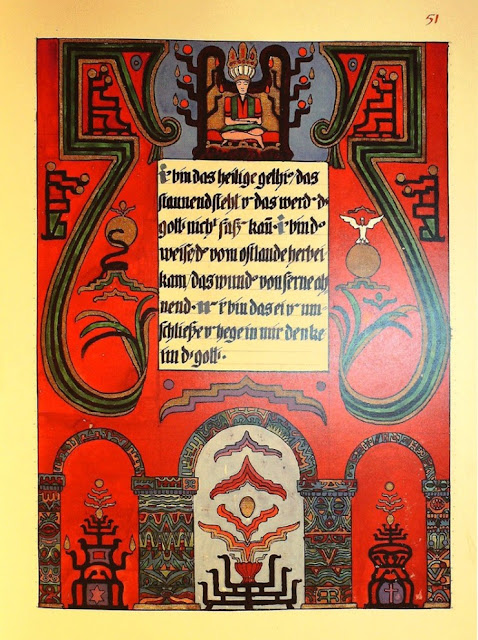"Within the Red Book's pages, truths unfold,
Jung's exploration of the psyche, a story untold. Liber Novus"
 |
| (Carl Jung on the left corner & Sigmund Freud in the center) |
"The Red Book" by Carl Jung is a remarkable exploration of the human psyche, filled with vivid imagery, profound insights, and a deeply personal journey. This article delves into the importance of reading "The Red Book" and the madness it unveils. We explore the historical context, the creative process behind its creation, and the transformative impact it had on Jung's own understanding of the mind. By diving into the depths of "The Red Book," we gain valuable perspectives on madness, creativity, and the depths of the human psyche.
1. The
Historical Context:
This section
delves into the historical context surrounding the creation of "The Red
Book." It examines Jung's personal struggles, including his break from
Sigmund Freud and the turmoil of World War I, which served as catalysts for his
introspective journey. It also discusses the cultural and intellectual climate
of the time, providing insight into the milieu that shaped Jung's thinking and
the significance of his work in the broader context of psychology.
2. The
Creative Process:
"The
Red Book" is not simply a written text but a visually stunning collection
of Jung's paintings, calligraphy, and personal reflections. This section
explores the creative process behind its creation, highlighting the importance
of active imagination, dream analysis, and Jung's engagement with his own
unconscious. It discusses how the imagery and symbolism in the book serve as
potent tools for accessing the depths of the psyche and understanding the
nature of madness.
3. Madness
and the Unconscious:
At the heart
of "The Red Book" lies Jung's exploration of madness and the
unconscious mind. This section delves into Jung's encounters with his own inner
demons and the descent into the abyss of his psyche. It examines how these
experiences challenged traditional notions of sanity and offered profound
insights into the transformative potential of madness. It also discusses Jung's
belief that embracing the darkness within is essential for personal growth and
individuation.
4.
Archetypes and Symbolism:
"The
Red Book" is rich in archetypal symbolism, which provides a framework for
understanding the depths of the human psyche. This section explores the
archetypal motifs and recurring symbols present in the book, such as the
anima/animus, the shadow, and the wise old man. It discusses how these
archetypes represent fundamental aspects of the human experience and offer
valuable insights into the nature of madness and the integration of the
unconscious.
5. The
Influence of "The Red Book":
"The
Red Book" had a profound impact on Jung's own work and on the field of
psychology as a whole. This section examines how the insights gained from his
personal journey influenced his later theories, including his concepts of the
collective unconscious, individuation, and the process of psychological
transformation. It also discusses the influence of "The Red Book" on
subsequent generations of psychologists, artists, and thinkers, solidifying its
status as a seminal work in the exploration of the human mind.
6. The
Contemporary Relevance:
Although
"The Red Book" was written over a century ago, its themes and
insights remain relevant today. This section explores the contemporary
relevance of the book, particularly in relation to mental health, creativity,
and the understanding of madness. It discusses how "The Red Book"
challenges traditional views of mental illness, offering a more nuanced and
compassionate perspective. It also examines the book's impact on contemporary
psychology and its potential as a source of inspiration and self-reflection.
Conclusion:
Reading
"The Red Book" is a transformative experience that allows us to delve
into the depths of the human psyche and confront the madness within. Jung's
personal journey, captured within its pages, offers profound insights into the
nature of madness, the transformative power of the unconscious, and the
importance of embracing the complexities of our own minds. By engaging with
"The Red Book," we open ourselves to new perspectives on mental
health, creativity, and the potential for personal growth.
Jung's words dance, illuminating the unknown.
Through symbols and dreams, his psyche unfurled,
A poetic journey, a wisdom-filled world.
Exploring the shadows, the depths of the soul,
A poetic odyssey, where truths unfold.
In verse and in prose, his insights unfurled,
The Red Book, a masterpiece, a poetical world." -- Nilofer Fathima.










Comments
Post a Comment
Fellow beings comment about my blog not about your personal vendettas.